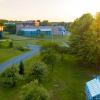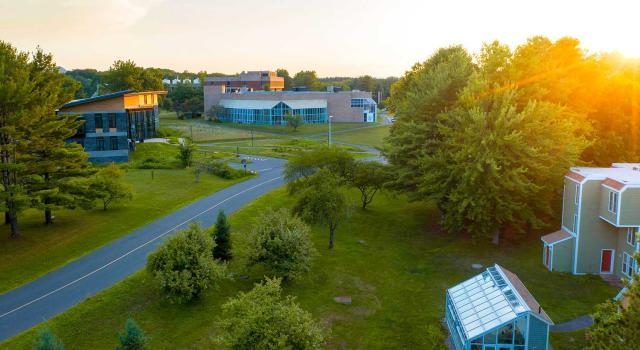Sustainable Hampshire
Climate change. Environmental justice. Structural transformation. Sustainability at Hampshire College is essentially connected to social justice and active citizenship as we grapple with the most urgent issues of our time.
Sustainability Hampshire is a home base for climate action and environmental justice. Our campus — featuring the net-zero R.W. Kern Center, Campus Farm, and two solar fields — offers unique educational opportunities in sustainability for students and faculty. Through courses, supported projects, and independent study, Hampshire students explore and address the urgent issue of climate change.
Climate Action Plan
The 2024 Climate Action Plan (CAP) outlines how Hampshire College acts on our shared responsibility in the face of climate change. Hampshire College has adopted these commitments:
- A Hampshire College education must provide our students with the tools and inspiration to be effective change agents in addressing the climate crisis.
- Hampshire College will eliminate on-campus fossil fuel use by 2034; and
- By 2040, Hampshire College must reach net-zero for all institutional emissions.
- Hampshire College must provide a safe, healthy, and resilient campus environment for all community members in the face of our changing climate.
EXPLORE MORE
Hampshire College’s Semester Unbound Creates Campus Climate Action Plan
As part of Hampshire’s recent curricular evolution, which further dissolved the already porous boundaries relating to disciplinary thinking in the College’s academics, a new kind of course, Semester Unbound, was born.
The inaugural class, Climate Action Unbound (CAU) worked to draft a climate action plan for Hampshire — a blueprint to prioritize sustainability in all College operations.
-
Sustainability at Hampshire spans everything from environmental design to environmental justice. These are just a few areas of study you might weave together.
Architecture and Environmental Design
Environmental Studies and Sustainability
Global Studies and International Relations
Sustainability Field Study and International Programs
-
-
Young People in the Climate Justice Movement
Creating a Regenerative Orchard at Hampshire College
Lymph + honey: Natural Haircare
Winnie’s Travels: Tutorials on Alternative Housing
Furthering a Sustainable Campus: Research Inspired by Hampshire College’s Living Building
Forest Hydrology and Senescence
Aquaponics and Cooperative Urban Agriculture
-
Our Sustainable Campus
-
The R.W. Kern Center is the 17th certified Living Building in the world; it generates its own electricity, collects and treats its own water, and is built with local, non-toxic, and low-carbon materials. Home to Admissions, Financial Aid, the Kern Kafé, and student and classroom spaces, the building also serves as a living laboratory where students and the faculty study its innovative systems and performance.
-
The Hampshire College Farm is a hub of food production and educational opportunity. Hampshire students and faculty use the farm to investigate intellectual, political, and scientific issues surrounding agriculture and animal husbandry. The farm also supplies vegetables and meat to dining services and the HampStore, sells CSA shares to the local community, and offers free CSA shares to all student mods. Student work-studies, volunteers, and interns are engaged in every aspect of the work on the farm, from planting and harvesting to animal care.
-
Our food services, including the dining hall, the Kern Kafé, the Bridge, and the HampStore, feature fresh, local food, some from the Hampshire College Farm itself. Hampshire’s sustainable food purchasing guidelines emphasizes food that minimizes negative environmental impacts; strengthens our local community; and supports the health, human rights, and economic security of our food workers.
-
Mixed Nuts is a student-run, volunteer-based co-op in the Roos-Rohde House that aims to promote equality, respect, honesty, and responsibility within the context of food systems and cooperatives.
-
Two large solar fields on campus provide up to 4.7 megawatts of power — enough to provide for all the College’s electricity needs at peak production. Other solar installations at the Chuck and Polly Longsworth Arts Center, Farm Center, and President’s House help to further reduce Hampshire's carbon footprint.
-
Hampshire spurred the creation of the New England College Renewable Partnership, a collaborative purchase agreement which enables the production and purchase of solar power by several area colleges.
-
Hampshire College provides four 220-volt electric vehicle (EV) charging stations on campus free to the community. Powered partly by our solar fields, these EV stations help build and support large scale adoption of electric vehicles.
-
The student-run Community Garden offers free open raised beds for planting and a gathering space and fire pit for community gatherings.
-
EnviroCom is an advisory body and action committee which engages the community in environmental and sustainability issues.
-
The Hampshire College Sustainability Revolving Fund (SURF) provides loans for campus improvement projects that benefit Hampshire's sustainability by improving efficiency and conserving resources. The SURF exists to foster student, staff, and faculty involvement in increasing environmental, social, and fiscal sustainability at Hampshire College.
-
Located on the Hampshire campus, the Hitchcock Center for the Environment offers education programs for kids, teens, and adults. Hampshire students may pursue work-study jobs or internships in environmental and childhood education at HCE to enrich their academic work.
-
Hampshire has several areas of ecologically-diverse meadow, planted to reduce fossil fuel use related to mowing, create wildlife and plant habitats, produce savings on grounds-care costs, and provide teaching, learning, and research opportunities.



